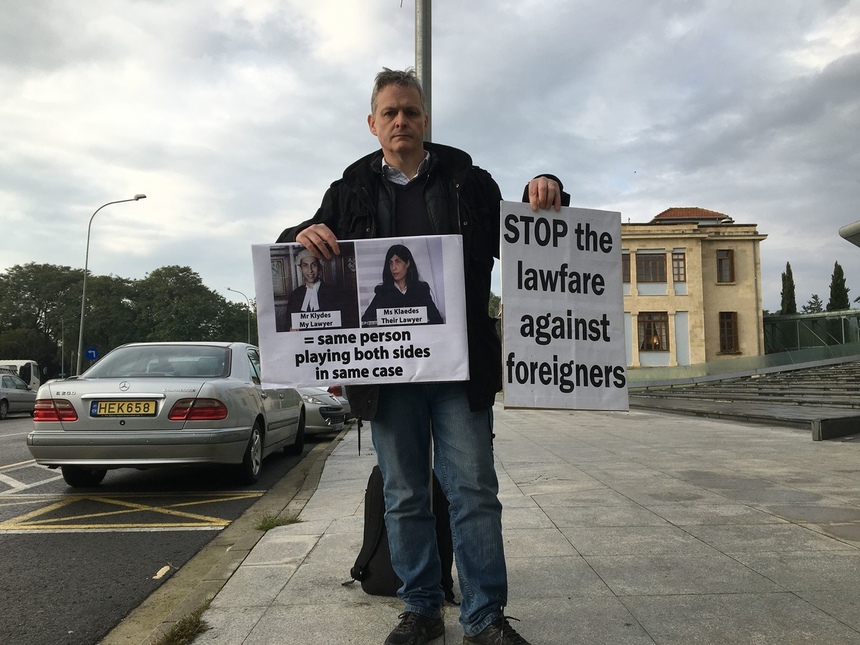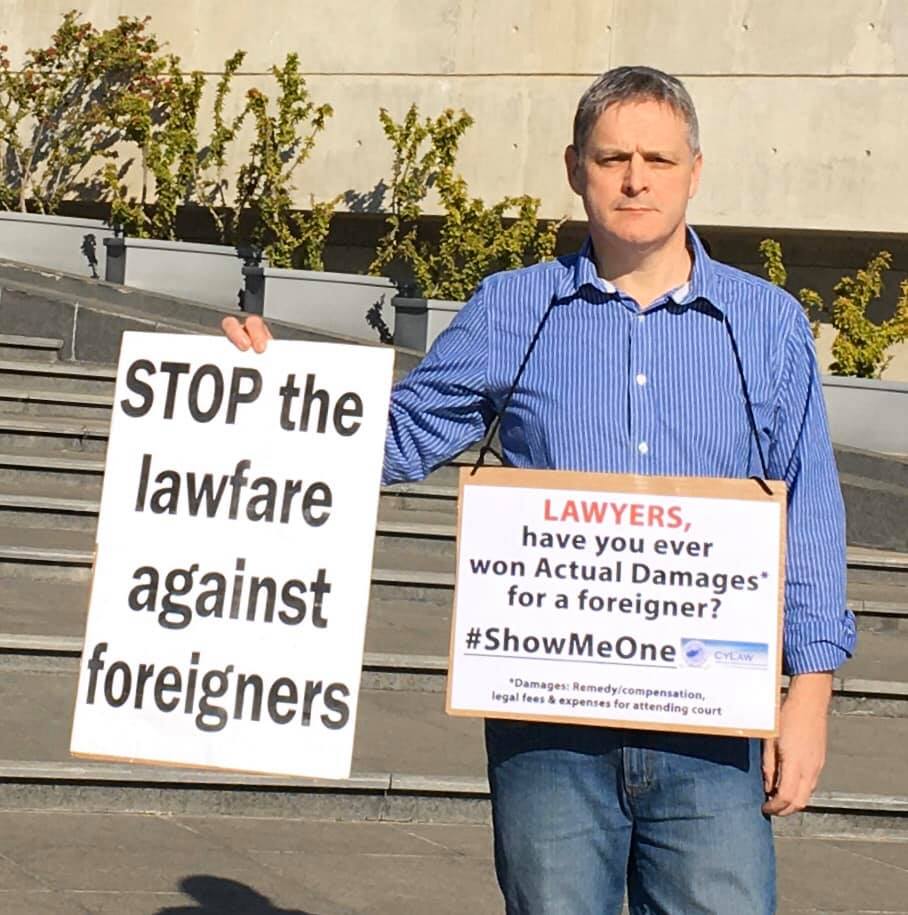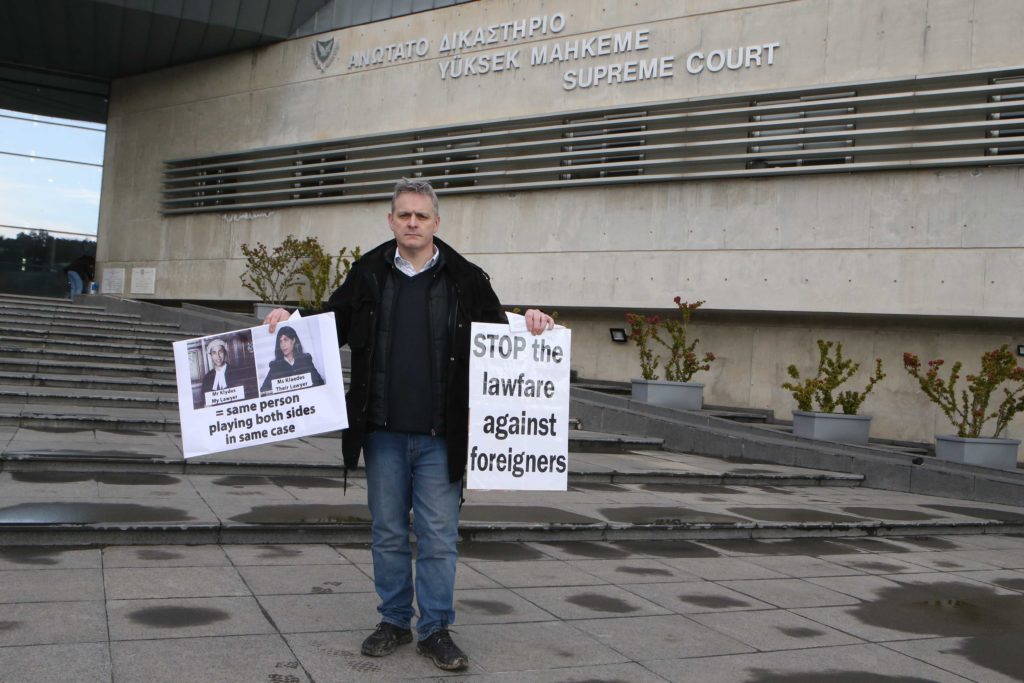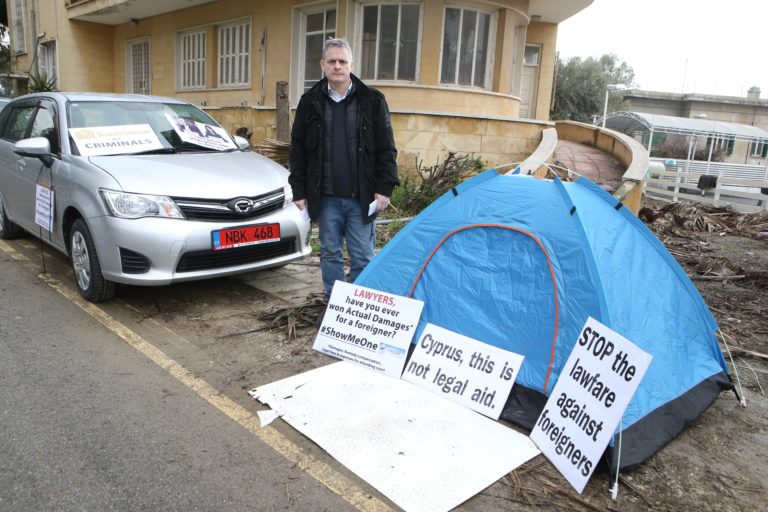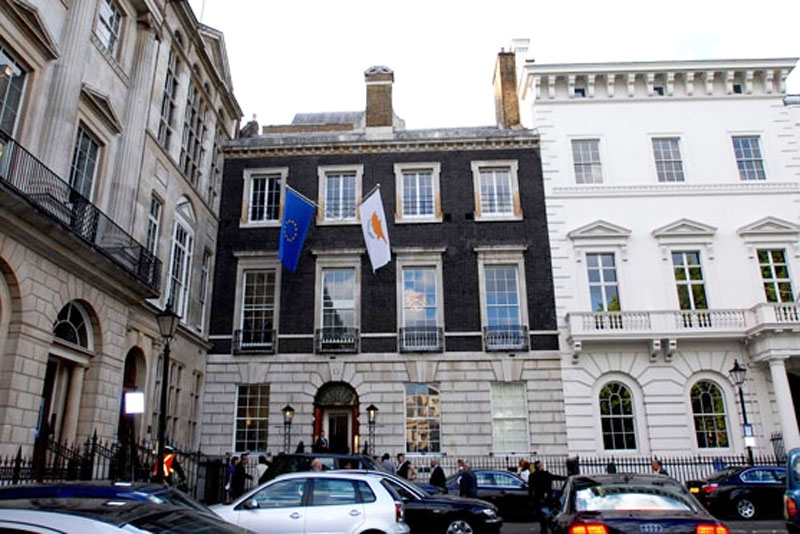Dear Sir,
Thank you for communicating on Twitter, for expressing interest in our situation and willingness to discuss in person. Below is a history of what led me to tell our story on social media and on my website BeyondContempt.com. I’ve detailed what went wrong with our property purchase, the assaults I suffered, the investigations, the court actions thus far and have included some conclusions.
1) When the Republic of Cyprus joined the EU, my wife and I saw an opportunity to move our young family there and start a business. Cyprus had long been our favourite holiday destination and we loved the people we met. Before choosing Cyprus, my wife and I were doing well in life, we were cash buyers for a house with no mortgage and we thought we were safe buying within the EU.
2) In August 2005 we bought a house from Christoforos Karayiannas and Son Ltd. It was an ‘off plan’ property with a delivery date of July 2006. We used an independent lawyer and our contract was deposited in the land registry for specific performance.
3) In February 2006 we disagreed with the developers over changes they had made to the plans, some of which breached the contract and others were clear misrepresentations at the point of sale. At this stage, the property was midway through construction and we had paid €113,000 in payments. We continued as contracted and kept up stage payments.
4) During an inspection trip to the development, I was assaulted by Christoforos Karayiannas and his son Marios Karayiannas, both directors of the company. I captured the assault on camera and they were arrested. After their arrest, they then claimed that I had breached our contract and they stated that they will keep all our money as compensation. A civil case for breach of contract was started by them in 2006 (case 365/2006).
5) In February 2007, we discovered that our house had been sold at a higher price to a British lady Mrs Michelle McDonald who had already taken up residence. This had happened in 2006 despite our contract still in the land registry. The higher price was reflective of the property boom at the time. When we discovered our house was occupied by another family, we wrote to Mrs McDonald but got no response.
6) A letter from our lawyer was then sent and a reply came back from her lawyer George Pittadjis stating “I am writing to you in answer to your letter to my client Michelle McDonald…” “She bought it in good faith and after she was told that a previous contract had been cancelled…” This was a lie; our contract had not been and could not be unilaterally cancelled. It was still lodged in the land registry for specific performance and we were the beneficial owners of the house.
7) It is worth noting that George Pittadjis was also at that time, the lawyer for Christoforos Karayiannas and Son Ltd. Years later in the private criminal prosecution, George Pittadjis committed perjury. Despite writing the above letter he stated under oath that he was not Mrs McDonald’s lawyer, that he had never met her before and he had no knowledge of any document of sale between Mrs McDonald and Christoforos Karayiannas and Son Ltd. This was reported to the Judge, the Chief of Police and the former Attorney General Petros Clerides and a year later the response came back that no criminal action would be taken.
8) In mid-2007, our lawyer began writing letters to the Police, the Attorney General and The Minister of Justice urging them to act against the developers, the lawyers involved and the unlawful occupant under section 303a of the criminal code. The authorities took no action.
303A.-(1) Any person who, with intent to defraud, deals in immovable property belonging to another is guilty of a felony and is liable to imprisonment for seven years.
(2) For the purposes of the present section a person shall be deemed to be dealing in immovable property where
(a) [that person] Sells to another, or rents to another, or mortgages to another or encumbers in any way, or makes available for use by another immovable property, or
(b) advertises or otherwise promotes the sale or renting out or mortgaging or charging in any way to another of immovable property or the use thereof by another, or
(c) concludes an agreement for the sale to another, or the renting out to another, or the mortgaging to another, or the charging in any way to the benefit of another, or the use by another of immovable property, or
(d) accepts the immovable property which is the object of the dealing as this is defined in the present subsection.
9) In late 2007, Christoforos and Marios Karayiannas walked free from court for my first assault. The local prosecutor didn’t call me to court and the case was discontinued in my absence. This wasn’t a mistake but a deliberate act by the prosecutor. That prosecutor had told my lawyer that they were going to adjourn the case as the court is too busy and that I’m not to show up. Then two days later in our absence, they filed a motion for nolle prosequi and the case was discontinued. The former Attorney General Petros Clerides refused to refile the case.
10) Just 3 months later, in January 2008 I was assaulted again. I had returned to Cyprus for meetings and to take photos of my house for the civil action. The developers were contracted to build a detached house and had instead built a link-detached house. This and other breaches needed to be documented for the court. Christoforos Karayiannas and his son Marios Karayiannas were alerted to my presence in the village and at the busy junction and in front of dozens of witnesses rammed my car and together with an employee, the three men assaulted me again. This assault was so severe, that I was in the hospital for five days, and it took six months till I was back to full health.
11) Months went by and despite letters to the Government, the former Attorney General Petros Clerides and the Police, no one would do anything against my developers. No one would investigate the unlawful selling of my house and no indictment or court date for my second assault was forthcoming. I was determined that this assault would not go the same way as the first, so in August 2008 I camped outside your High Commission in St James’s Square and remained there for 74 days and nights protesting my abuse and your government's inaction. I only left that pavement when finally, I was assured that a court date was set for my second assault and that an investigation into the unlawful selling of my house would take place.
12) Not long after leaving that protest, we got a response from the former Attorney General’s office stating that they will take no action as they have found no criminal offence in the selling my house to another. When asked for clarification of that three lined letter, the reply came back, that the Attorney General does not have to provide clarification. When pressed by the Cyprus Mail, Paulina Evthyvoulou–Evthymiou, the Counsel for the Republic said:
“This is a civil case and not a matter for the Attorney General,” she said. “If he had a judgement from a civil case that he was the owner, it would be different. The civil case is unresolved. I don’t have an owner and I’m not in a position to decide who the owner is,”
It seems that the former Attorney General Petros Clerides decided that in Cyprus, criminal law is now subordinate to civil law, whereas the long-standing position has been the reverse.
13) In January 2009 I began attending court in Cyprus which lasted four years and exhausted all our finances. While undergoing around 30 trips and spending months away from my family, I had about every right to a fair trial abused.
14) As the former Attorney General saw no criminal offence in selling the same house twice, we had little choice but to proceed with a private criminal prosecution against Christoforos Karayiannas and Son Ltd, the two directors and Michelle McDonald (case 1912/09). At Larnaca District Court, the judge accepted evidence from the Department of Lands and Surveys who confirmed our contract had been duly signed and lodged with the land registry for specific performance. The court heard evidence that we made stage payments of €113,000 until the developer refused to accept any further payment. The judge accepted that the property was resold to another without our consent or applying for a court order to withdraw the contract from the land registry.
15) The judge ruled that there was a case to answer. However, the defendants chose not to give any verbal or written testimony and the judge proceeded to find them not guilty. She acquitted them from all charges and ordered us to pay costs. The ruling stated that although we submitted a sales contract to the land registry, that did not mean, we automatically and in perpetuity had become the owners of the residence and that the civil courts must first decide who the beneficial owner of a property is.
16) Therefore, upon that judgement the situation remained unchanged, our money was still with the developer and our house still occupied. We appealed the verdict and disturbingly, in October 2013 the Supreme Court upheld the lower court’s decision in full, acquitting the developers and the occupant of all criminal charges.
17) It is clear then, that according to this judgement, a contract deposited at the land registry no longer means you are the beneficial owner of that property. In July 2009 while addressing the title deeds issue, Mr Neoclis Sylikiotis, the former Minister of the Interior stated:-
“It must also become clear that the ownership status of a buyer-owner of immovable property in Cyprus is definitely secured and cannot be challenged, as long as the buyer-owner has submitted the buying-contract to the Department of Lands and Surveys.”
This statement is now false. The Supreme Court has made it clear that it is no longer a criminal offence for a developer to sell the same property repeatedly. This is now a civil issue and the buyers must first prove to the civil courts any claim over the property. The current time scale for a civil case is 13-14 years. Our case turns 13 years old in March.
18) In January 2011 for the civil action in the first assault, Christoforos and Marios Karayiannas were found liable, but the damages awarded did not cover my legal fees, let alone my expenses for attending court and barely covered the damage to the video camera that recorded the assault.
19) In the criminal case for the second assault (case 4155/2008) Christoforos and Marios Karayiannas and their employee were found guilty but given a suspended sentence. A suspended sentence after a two-year court battle. My cross-examination alone took fourteen court days, not consecutive days but spread over months. I endured over twenty hours of cross-examination for an attack that took less than ten minutes.
20) I was forced by the court to fly back and forth and spend months away from my family, all at my expense. I was abused on the stand and through exhaustion, I broke down many times. I begged the judge not to do this as I was the victim of the crime. What I went through in court over those two years was worse than the assault itself and it cost me tens of thousands of pounds. During one abusive session, Karayiannas’ lawyer Efthimios Flourentzou shouted “You deserved what you got” as I showed pictures of my injuries. Apparently, I deserved what I got because I told my story on the internet. In court, the judge sought no apology for the comment. I complained about this abuse at the highest levels, which resulted in a meeting at the Presidential Palace with Mr Christos Christofides, Director of the President’s Office. Nothing was done to help although soon after Mr Efthimios Flourentzou was made Minister of Communications.
21) The verdict and sentencing made no sense, not in the law of Cyprus or English Common Law. The judge misapplied case law that can reduce murder to manslaughter and said that the defendants suffered a sudden and temporary loss of self-control when they attacked me. That case law was misused first to reduce the sentence and then misused again to suspended it entirely, another legal error. The prosecution appealed the sentence.
22) The appeal was heard without the lower court transcripts, so the Supreme Court did not hear that this was my second assault or that the accused had phoned the police ahead of the attack to say they were on their way to do it. This assault was premeditated and not a sudden and temporary loss of self-control. Without any court transcripts, the Supreme Court unanimously upheld the lower court’s decision in full and made the comment that the suspended sentence was appropriate because the accused were always willing to plead guilty. The accused put up a two-year fight in court and were never willing to plead guilty to any charge.
23) Karayiannas father and son then put up another two-year fight in the civil case where again they were found liable for the assault and again, I was awarded virtually nothing. Nothing for my legal fees, nothing for the four years of flights and accommodation, not even the money for the car they rammed or the camera they smashed was awarded. I was granted legal aid under EU directive 2002/8/EC which deals with cross border disputes, but this was never paid. This case is being appealed and it’s now over 11 years since this assault.
24) September 2012 saw the judgement for the civil case 365/2006. This lawsuit by Karayiannas was claiming breach of contract and defamation for publications on my website. We had a counterclaim for breach of contract. The judge at Larnaca District Court ruled that we did not breach our contract and that Karayiannas had unlawfully cancelled it and had unlawfully retained our money. It was ruled that the house was sold again without our knowledge. However, in another atrocious decision, the court failed to award us any damages. We got nothing for our legal fees which by then exceeded the amount they stole. Nothing for the rise in the value of the house. Nothing for our expenses in attending court, flying back and forth for years. Nothing for the years in rented accommodation and of course no punitive damages or any penalty to prevent another developer doing the same again to another British buyer.
25) Despite the verdict agreeing that Karayiannas’ claim, that I breached the contract was untrue, the court went on to fine me a national record for defamation of €50,000 for merely calling my developers liars on my website. I have been telling my story on the internet since 2006 of how I’ve been treated as a customer and there was no defamation on my website. The company showed no damages for defamation as they refused to bring their financial accounts to court, but €50,000 was awarded to them anyway. On top of that record-breaking fine for defamation, I was also fined €10,000 for the use of a word. For calling the company Karayanus instead of Karayiannas on a page on my website. I used that derogatory name as a customer against this company, only after my second assault, after I’d been hospitalized and after the fraud of reselling our house had already been exposed.
26) This ruling was given by a judge who refused to recuse himself. Our case had fallen into the lap of a Judge Tefkros Economou. We asked the judge to recuse himself because of an unusual action he had personally taken against me in favour of Karayiannas some years earlier. In 2008, Judge Economou had personally handed over a file to the Attorney General for an investigation of criminal liability against me, for the publication of the audio of my business conversations with Karayiannas. The Attorney General found no criminal liability.
27) We knew we wouldn’t get a fair hearing with Judge Tefkros Economou and that something was very wrong from the outset, so we asked him to recuse himself and he refused. Now a Supreme Court Judge, Tefkros Economou is in the news this week for presiding over a case against the Bank of Cyprus. Many people are unhappy because his wife worked for the bank. I waited 6 years for my day in the district court and it is a terrible feeling, standing before a judge you know is against you from the outset.
28) There were many things wrong in the courtroom. The lawyer representing Christoforos Karayiannas and Son Ltd was Ms Adrianna Klaedes. Ms Adrianna Klaedes was previously known as Mr Andrew Klydes. Mr Andrew Klydes once represented me in this same case and was key in early litigation. I was horrified when he swapped sides. This was brought to the attention of Judge Economou who did nothing except wave away any related testimony and refused to accept any evidence showing this to be the case. Judge Economou made no comment to this in his verdict.
29) In this case, I was granted legal aid under EU directive 2002/8/EC which deals with cross border disputes within the EU (see attached Cyprus Mail article). To be granted this in Cyprus was not a simple form filling exercise but many trips and a mini-trial to prove I could no longer afford to continue. In a few short years, we went from buying a house in cash to debt and living in rented accommodation. Our life savings had gone to the property developer, my lawyer and years of expenses in attending court in the criminal actions where I was a witness for the state.
30) However, although I was ‘granted’ this legal aid it was never paid, hampering my case in court. No official court translator would work the case for fear the court would not pay them. Without legal aid, I could not afford a trained translator so instead, I had to rely on a bilingual expat. I could not afford any documents translated nor bring in any expert witnesses. I walked out of court several times in protest of no translator and ceased proceedings. My lawyer walked out too because he was not paid and only returned on the promise he would be paid at the end, but he never was.
31) We are appealing on many grounds including the refusal of the judge to step aside and have a hearing date of 10th April 2019 (appeal 435/2012). This is the last opportunity for the Judiciary of Republic of Cyprus to resolve the issue.
32) For a fair hearing on 10th April 2019 (appeal 435/2012) we need the legal aid that was granted under EU directive to be paid, so we can afford to attend court and pay for a professional translator (see paragraphs 29 & 30).
33) For the appeal, we also need all transcripts of the lower court’s proceedings (case 365/2006) to be given in English or in a digital format so that I can translate them electronically. It is unfair to deny us both the funds to translate paper documents and the digital copies. It has been six years since proceedings and these transcripts have not been produced in any form. Remember, the lower court transcripts were not produced at the criminal appeal for my second assault and the case was lost without them (see paragraphs 21 & 22). I do not want history to repeat itself.
34) I also need my expenses for attending court in the criminal case refunded (case 4155/2008). Although the victim of the crime I was merely a witness for the state and gave my receipts to the prosecutor for attending court. I undertook many trips and had to spend eight weeks away from my family just to complete my testimony for a ten-minute attack. The court forced me to do this and assured me that my expenses would be paid at the end (see paragraphs 19 & 20).
35) Unfortunately, I have been following property cases for thirteen years now and no British individual has ever got justice in Cyprus. No one has ever won their case and been awarded real damages, expenses including their legal fees back. It has never happened. If a court case of fourteen years isn’t chilling enough for a British citizen, the truth is, not one property developer or crooked lawyer has ever been truly punished. We British, as I have shown above, win our court cases but loose outright
36) I fervently believe that our nationality has affected the way in which our cases have been dealt with and pursued. If action had been taken early against our property developer, then much of what happened could have been avoided. We have found no solace in the legal system, the courts have been viciously uneven and after thirteen years of litigation, our property developer remains unpunished.
37) Legal precedent established the rule that a contract in the land registry secures your rights as the beneficial owner of that property. I have now proved in the civil courts that I did not breach my contract and that our house was sold to another. If a house is sold twice then that should be a criminal fraud and you cannot prevent a customer from sharing his experience online. I have little doubt that we are heading to the ECHR where the conduct of my property developer will be defended by the state and the burden placed on the taxpayers. This will not concern Christoforos Karayiannas and Son Ltd nor their lawyer Ms Adrianna Klaedes, who have both been in court on several occasions for not paying their taxes.
38) I have laid out our abuses and they all stem from the Republic of Cyprus and are continuing today. Despite our letters, our protests, the press and my online campaign, I regret to say, that in thirteen years we have had no help from any government authority or industry body.
39) We have lost everything and this whole situation and the time taking to resolve, has had a terribly detrimental effect on us and our family life. It has ruined our lives, but we will never give up in our pursuit of justice.
40) I have given a brief outline of our thirteen-year plight here, tried to stick to court ascertained facts and I’ve kept my opinion to a minimum. I have however, excluded some serious issues which cannot be explained away by accident, oversight or overwork, all of which have led us to believe that corruption and collusion have been at play. This sensitive and controversial area is more difficult to demonstrate in a letter and I would like to take you up on your offer to meet in person where we can discuss my situation and I can share my concerns.
Yours sincerely,
Conor O’Dwyer


